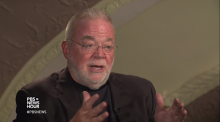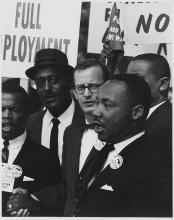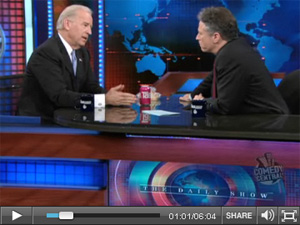socialism

Pope Francis’ strident critique of “unbridled capitalism” has turned heads across the globe. Ahead of his upcoming visit to the United States, American politicians, religious leaders, and laypeople are eager to hear how Pope Francis thinks about economics.
Economics correspondent Paul Solman spoke with Jim Wallis and others in a segment for PBS Newshour about why the pope wants us to stop worshiping capitalism.
Jim Wallis explained how Pope Francis’ critique of capitalism matches God’s vision for the world, as well as the ministry and example of Jesus:


If the latest Billboard album chart is anything to go by, the answer to Victor Hugo’s question “Do you hear the people sing”? is a resounding “Yes!” as the soundtrack to the latest film adaption of his novel has hit number one. More ambiguous however, is the answer to the question: do we understand what they are singing?
Many know of Dr. Rev. Martin Luther King Jr.’s “Letter from a Birmingham Jail.” Fewer know of Dr. King’s letter from a Selma jail where he wrote, “If we are to achieve a real equality, the U.S. will have to adopt a modified form of socialism.” This week will see President Obama sworn into office by laying his hand upon the Bible of America’s greatest preacher and prophet, M.L. King. If the appropriateness of King’s radical legacy being invoked by Obama goes beyond being skin deep, might we also ask the question: do we hear and understand the song Martin King sung?
As many blogs will brim with praise for Martin Luther King, Jr., with little mention of his politics, so too are they awash with praise for the latest Les Misérables film without mention of its vision for society. They praise Hugh Jackman and Anne Hathaway’s ability to blubber while beautifully belting out ballads. They have shown the Christian virtue of mercy to Russel Crowe’s singing (at least more mercy than the infamous critique of his musical ability by Australian punk band Frenzal Rhomb). All this before moving on to talk of Les Misérables’ less-than-subtle Christian themes.
As CNN reported, since the micro-targeted marketing success of movies like The Passion of the Christ, film studios have been courting Christians to exchange their pews for popcorn and Gospel songs for cinema going. Again, this time with Les Misérables, the faithful have responded to the box office like it was an altar call offered with Dr. King’s eloquence.
Listening to the scriptures requires a gentle determination to remove the filters that tend, in our religious culture, to allow in only what serves individual solace or personal edification. The scriptures probe the realities of power, how it is cornered, monopolized, deployed, lost, and regained at every level—in societies, in institutions, in families—as well as in the dynamics of our own lives. Even the best Bible study groups and sermons often surrender to the bias exerted unconsciously by our own individual neediness. Perhaps a conscious policy is needed to heed the word of God as it dissects the social body, lays bare its anatomy, and reveals its diseases. This approach may have a greater impact on our personal lives than conventional piety.
Far from reducing the spirituality of our engagement with scripture, learning its hermeneutic of power is likely to intensify our appreciation of its relevance to our own immediate issues and needs. As persons, we internalize and encapsulate the forces at work on a larger scale in a struggling world. God is wholly present as redemptive, suffering, hope-engendering love at every level of existence—from the inner dynamics of the soul to couples, families, neighborhoods, nations, the planet, and the entire universe. One of the most ancient religious instincts of humanity gave rise to the concept of the human person as a microcosm, a world in miniature. Scripture’s word is addressed to us in our unique personhood, and to the churches, communities, and nations in which we are embedded.
!["Moses mit den Gesetzestafeln" via Wylio [http://www.wylio.com/credits/Flickr/3542205854] "Moses mit den Gesetzestafeln" via Wylio [http://www.wylio.com/credits/Flickr/35](https://sojo.net/files/styles/medium/public/blog/duyde.jpg)
The primary political conversation that is happening in our country isn’t a dualistic battle between a “free market” system and a “statist/socialist” one. It is determining which mix of institutions and organizations are best equipped to meet societal challenges and achieve collective goals while allowing for individual freedom and human flourishing.
There aren’t many people who would argue that we need a new federal bureaucracy to run all of our grocery stores. But, you will find people who have varying views as to the government’s role in ensuring that those in need have basic access to nutrition, or what information the government should mandate that growers, producers, or sellers of food disclose to consumers.
Rabbi Spero makes some important scriptural points as to the importance of personal responsibility, human creativity, and freedom, but fails to deal with any passages that might temper or balance his views of capitalism.
I thought Glenn Beck must have moved on to other things, but the other night, he went back to his attack on social justice churches. This time the issue was climate change.
Last week, The Washington Post's On Faith site devoted their weekly Q&A to the debate over social justice which they titled, "Wallis vs.
The Catholic church is reeling from the several sexual abuse allegations that have come to light over the past three months. Downplaying the severity of this scandal will only further damage the already beleaguered church's image and credibility. Many in the media blame Pope Benedict XVI for the mismanagement of the sexual abuse crisis.
When Glenn Beck promised to devote a whole week of his television show to come after me, I wasn't sure he really meant it. I guess he did. Last night he began to make good on the threat he made on his radio show that "the hammer will fall."
When President Obama took questions from Congressional Republicans recently, he spoke about Republican characterizations of his health-care reform plan as something akin to a "Bolshevik plot." Ther
 Joe Biden admitted last night on The Daily Show that the billions of dollars we've spent on big bank bailouts is "socialism for the rich, and capitalism for the poor." No kidding. There's been much consternation related to the bailout of Wall Street. And even though ...
Joe Biden admitted last night on The Daily Show that the billions of dollars we've spent on big bank bailouts is "socialism for the rich, and capitalism for the poor." No kidding. There's been much consternation related to the bailout of Wall Street. And even though ...